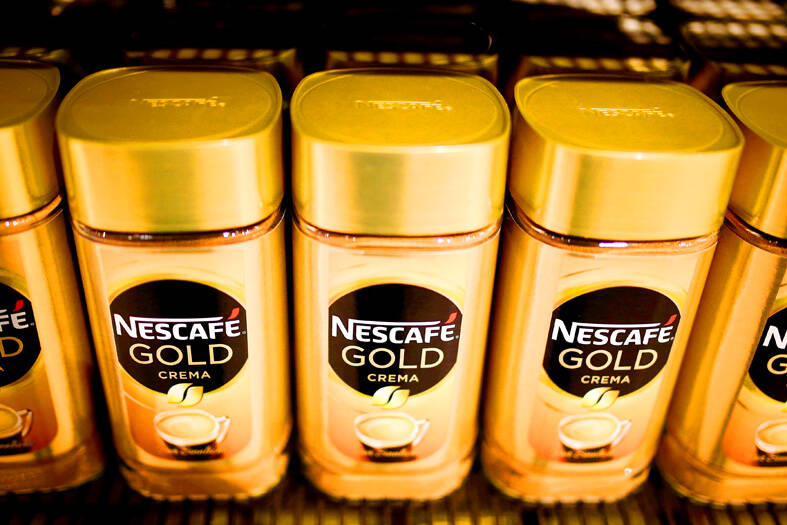Nestle SA chief financial officer Francois-Xavier Roger has forecast a challenging six months before inflation starts to ease in the second half of next year.
“We are likely going to go into a recession — we know that the next six months are probably going to be complicated and difficult,” the executive at the maker of Nescafe and KitKat said in a broad-ranging interview this month.
That would trigger a slowdown in consumption, he added.

Photo: Reuters
Consumer-goods groups like Nestle have been grappling with sharply higher input costs this year. Many have pushed through record price hikes, denting demand for their products. Rate hikes in major economies such as the US, the eurozone countries and the UK are an additional strain on households.
Further wage inflation and electricity prices rocketing in Europe would add pressure.
At an investor presentation in Barcelona, Spain, on Nov. 29, Nestle chief executive officer Mark Schneider said that the company had not been able to fully compensate for rising costs, adding that restoring its gross margin to previous levels will be harder if there is a recession.
“Certainly there will be quite a lot of inflation still at the beginning of next year and for the next six months after that,” Roger said. “I think probably in the second half of 2023 we may start to see some softening.”
Roger cited freight rates as a good indicator that a recession is around the corner.
The price to ship a maritime container on the benchmark Shanghai-to-Los Angeles route has plummeted to below US$2,000 from about US$10,000 at the start of the year, according to Drewry Shipping Consultants.
Nestle, the world’s biggest food company, expects to spend 1 billion swiss francs (US$1.1 billion) on investments such as more sustainable packaging and carbon reduction next year, an increase on almost SF800 million this year and SF500 million last year.
Environmental, social and governance reporting should soon become mandatory, Roger said.
Nestle is working to reduce its carbon footprint and achieve net zero by 2050 and a 20 percent reduction by 2025 compared to 2018. To do so, it is altering manufacturing and packaging practices in its supply chain, which accounts for 95 percent of its emissions. It is also investing in making more of its plastic packaging recyclable.
Roger said he is looking for a return on those investments, meaning that “we have an impact in terms of carbon reduction, in terms of plastic reduction, in terms of water reduction.”

SELL-OFF: Investors expect tariff-driven volatility as the local boarse reopens today, while analysts say government support and solid fundamentals would steady sentiment Local investors are bracing for a sharp market downturn today as the nation’s financial markets resume trading following a two-day closure for national holidays before the weekend, with sentiment rattled by US President Donald Trump’s sweeping tariff announcement. Trump’s unveiling of new “reciprocal tariffs” on Wednesday triggered a sell-off in global markets, with the FTSE Taiwan Index Futures — a benchmark for Taiwanese equities traded in Singapore — tumbling 9.2 percent over the past two sessions. Meanwhile, the American depositary receipts (ADRs) of Taiwan Semiconductor Manufacturing Co (TSMC, 台積電), the most heavily weighted stock on the TAIEX, plunged 13.8 percent in

A wave of stop-loss selling and panic selling hit Taiwan's stock market at its opening today, with the weighted index plunging 2,086 points — a drop of more than 9.7 percent — marking the largest intraday point and percentage loss on record. The index bottomed out at 19,212.02, while futures were locked limit-down, with more than 1,000 stocks hitting their daily drop limit. Three heavyweight stocks — Taiwan Semiconductor Manufacturing Co (TSMC, 台積電), Hon Hai Precision Industry Co (Foxconn, 鴻海精密) and MediaTek (聯發科) — hit their limit-down prices as soon as the market opened, falling to NT$848 (US$25.54), NT$138.5 and NT$1,295 respectively. TSMC's

ASML Holding NV, the sole producer of the most advanced machines used in semiconductor manufacturing, said geopolitical tensions are harming innovation a day after US President Donald Trump levied massive tariffs that promise to disrupt trade flows across the entire world. “Our industry has been built basically on the ability of people to work together, to innovate together,” ASML chief executive officer Christophe Fouquet said in a recorded message at a Thursday industry event in the Netherlands. Export controls and increasing geopolitical tensions challenge that collaboration, he said, without specifically addressing the new US tariffs. Tech executives in the EU, which is

TARIFFS: The global ‘panic atmosphere remains strong,’ and foreign investors have continued to sell their holdings since the start of the year, the Ministry of Finance said The government yesterday authorized the activation of its NT$500 billion (US$15.15 billion) National Stabilization Fund (NSF) to prop up the local stock market after two days of sharp falls in reaction to US President Donald Trump’s new import tariffs. The Ministry of Finance said in a statement after the market close that the steering committee of the fund had been given the go-ahead to intervene in the market to bolster Taiwanese shares in a time of crisis. The fund has been authorized to use its assets “to carry out market stabilization tasks as appropriate to maintain the stability of Taiwan’s